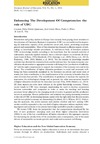Identificador persistente para citar o vincular este elemento:
https://accedacris.ulpgc.es/jspui/handle/10553/52550
| Campo DC | Valor | idioma |
|---|---|---|
| dc.contributor.author | Davila Quintana, Carmen Delia | en_US |
| dc.contributor.author | Mora, José-Ginés | en_US |
| dc.contributor.author | Pérez, Pedro J. | en_US |
| dc.contributor.author | Vila, Luis E. | en_US |
| dc.contributor.other | Davila-Quintana, Delia | |
| dc.date.accessioned | 2018-11-30T08:46:19Z | - |
| dc.date.available | 2018-11-30T08:46:19Z | - |
| dc.date.issued | 2016 | en_US |
| dc.identifier.issn | 0141-8211 | en_US |
| dc.identifier.uri | https://accedacris.ulpgc.es/handle/10553/52550 | - |
| dc.description.abstract | This article aims at clarifying whether and how University Business Cooperation (UBC) can be expanded from knowledge transfer to the core field of education. Higher education institutions exert a decisive influence by teaching students to understand academic theories, methods and areas of knowledge, contributing to their cultural enrichment and development of personality, and preparing them for further work and other spheres of life. Higher education aims at establishing the basis of relevant knowledge that will help students to understand and acquire the competencies they will need in their professional lives. Universities supply graduates to the economy and that includes developing the right set of skills to acceptable levels. Consequently, an explicit goal of UBC should be to point out what those skills should be and how to target education at developing them. The competencies acquired by the flow of new graduates emerging each year from higher education institutions in the labour market is an expression of the multidimensional output obtained from the resources allocated to the higher education system. New ways for UBC are called to play a prominent role in defining both a model of teaching and learning that is better adjusted to social and economic demands and a dynamic and flexible system of continuing education to retrain people as social and economic conditions evolve. Nevertheless, the implementation of reforms in higher education calls for a deeper understanding of possible trade-offs between the diverse types of resources involved and the outcomes obtained. Resources should be examined in terms of their relative costs and the results interpreted with regard to their value to individuals and society. | en_US |
| dc.language | eng | en_US |
| dc.publisher | 0141-8211 | - |
| dc.relation.ispartof | European Journal of Education | en_US |
| dc.source | European Journal Of Education[ISSN 0141-8211],v. 51 (1), p. 10-24 | en_US |
| dc.subject | 53 Ciencias económicas | en_US |
| dc.subject.other | Competency development | en_US |
| dc.subject.other | Employability | en_US |
| dc.subject.other | Lifelong learning | en_US |
| dc.subject.other | Teaching & learning model | en_US |
| dc.subject.other | UBC | en_US |
| dc.title | Enhancing the development of competencies: The role of UBC | en_US |
| dc.type | info:eu-repo/semantics/Article | es |
| dc.type | Article | es |
| dc.identifier.doi | 10.1111/ejed.12162 | |
| dc.identifier.scopus | 84958683154 | |
| dc.identifier.isi | 000371154100003 | |
| dcterms.isPartOf | European Journal Of Education | |
| dcterms.source | European Journal Of Education[ISSN 0141-8211],v. 51 (1), p. 10-24 | |
| dc.contributor.authorscopusid | 56581573100 | |
| dc.contributor.authorscopusid | 56265400800 | |
| dc.contributor.authorscopusid | 55429483100 | |
| dc.contributor.authorscopusid | 9271951700 | |
| dc.description.lastpage | 24 | - |
| dc.identifier.issue | 1 | - |
| dc.description.firstpage | 10 | - |
| dc.relation.volume | 51 | - |
| dc.investigacion | Ciencias Sociales y Jurídicas | en_US |
| dc.type2 | Artículo | en_US |
| dc.identifier.wos | WOS:000371154100003 | |
| dc.contributor.daisngid | 5298184 | |
| dc.contributor.daisngid | 2348897 | |
| dc.contributor.daisngid | 114631 | |
| dc.contributor.daisngid | 3681333 | |
| dc.contributor.daisngid | 28142574 | |
| dc.identifier.investigatorRID | H-6382-2016 | |
| dc.contributor.wosstandard | WOS:Quintana, CDD | |
| dc.contributor.wosstandard | WOS:Mora, JG | |
| dc.contributor.wosstandard | WOS:Perez, PJ | |
| dc.contributor.wosstandard | WOS:Vila, LE | |
| dc.date.coverdate | Marzo 2016 | |
| dc.identifier.ulpgc | Sí | es |
| dc.description.sjr | 0,685 | |
| dc.description.jcr | 0,906 | |
| dc.description.sjrq | Q1 | |
| dc.description.jcrq | Q3 | |
| dc.description.ssci | SSCI | |
| dc.description.erihplus | ERIH PLUS | |
| item.fulltext | Con texto completo | - |
| item.grantfulltext | open | - |
| crisitem.author.dept | Departamento de Métodos Cuantitativos en Economía y Gestión | - |
| crisitem.author.orcid | 0000-0002-4608-1040 | - |
| crisitem.author.fullName | Dávila Quintana, Carmen Delia | - |
| Colección: | Artículos | |
Los elementos en ULPGC accedaCRIS están protegidos por derechos de autor con todos los derechos reservados, a menos que se indique lo contrario.
